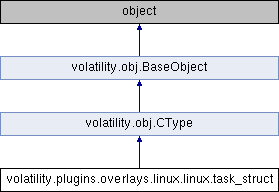|
|
def | is_valid_task (self) |
| |
|
def | comm (self) |
| |
|
def | getcwd (self) |
| |
|
def | get_elf (self, elf_addr) |
| |
|
def | uid (self) |
| |
|
def | gid (self) |
| |
|
def | euid (self) |
| |
|
def | find_heap_vma (self) |
| |
|
def | bash_hash_entries (self) |
| |
|
def | ldrmodules (self) |
| |
|
def | plt_hook_info (self) |
| |
|
def | apihook_info (self) |
| |
|
def | bash_history_entries (self) |
| |
|
def | psenv (self) |
| |
|
def | bash_environment (self) |
| |
|
def | lsof (self) |
| |
|
def | SOCKET_I (self, inode) |
| |
|
def | netstat (self) |
| |
|
def | get_process_address_space (self) |
| |
|
def | get_libdl_maps (self) |
| |
|
def | threads (self) |
| |
|
def | get_proc_maps (self) |
| |
|
def | get_proc_maps_rb (self) |
| |
|
def | search_process_memory |
| |
|
def | elfs (self) |
| |
|
def | ACTHZ (self, CLOCK_TICK_RATE, HZ) |
| |
|
def | SH_DIV (self, NOM, DEN, LSH) |
| |
|
def | TICK_NSEC (self) |
| |
| def | get_time_vars (self) |
| | Sometime in 3. More...
|
| |
|
def | get_boot_time (self) |
| |
|
def | get_task_start_time (self) |
| |
|
def | get_environment (self) |
| |
|
def | get_commandline (self) |
| |
| def | __init__ (self, theType, offset, vm, name=None, members=None, struct_size=0, kwargs) |
| | This must be instantiated with a dict of members. More...
|
| |
|
def | size (self) |
| |
|
def | __repr__ (self) |
| |
|
def | d (self) |
| |
|
def | v (self) |
| | When a struct is evaluated we just return our offset.
|
| |
|
def | m (self, attr) |
| |
|
def | __getattr__ (self, attr) |
| |
|
def | __setattr__ (self, attr, value) |
| | Change underlying members.
|
| |
|
def | __init__ (self, theType, offset, vm, native_vm=None, parent=None, name=None, kwargs) |
| |
|
def | obj_type (self) |
| |
|
def | obj_vm (self) |
| |
|
def | obj_offset (self) |
| |
|
def | obj_parent (self) |
| |
|
def | obj_name (self) |
| |
|
def | obj_native_vm (self) |
| |
|
def | set_native_vm (self, native_vm) |
| | Sets the native_vm.
|
| |
|
def | rebase (self, offset) |
| |
|
def | proxied (self, attr) |
| |
|
def | newattr (self, attr, value) |
| | Sets a new attribute after the object has been created.
|
| |
|
def | write (self, value) |
| | Function for writing the object back to disk.
|
| |
|
def | __getattr__ (self, attr) |
| | This is only useful for proper methods (not ones that start with __ )
|
| |
|
def | __setattr__ (self, attr, value) |
| |
| def | __nonzero__ (self) |
| | This method is called when we test the truth value of an Object. More...
|
| |
|
def | __eq__ (self, other) |
| |
|
def | __ne__ (self, other) |
| |
|
def | __hash__ (self) |
| |
|
def | m (self, memname) |
| |
|
def | is_valid (self) |
| |
|
def | dereference (self) |
| |
|
def | dereference_as (self, derefType, kwargs) |
| |
|
def | cast (self, castString) |
| |
|
def | v (self) |
| | Do the actual reading and decoding of this member.
|
| |
|
def | __format__ (self, formatspec) |
| |
|
def | __str__ (self) |
| |
|
def | __repr__ (self) |
| |
|
def | d (self) |
| | Display diagnostic information.
|
| |
|
def | __getstate__ (self) |
| | This controls how we pickle and unpickle the objects.
|
| |
|
def | __setstate__ (self, state) |
| |

 Public Member Functions inherited from volatility.obj.CType
Public Member Functions inherited from volatility.obj.CType Public Member Functions inherited from volatility.obj.BaseObject
Public Member Functions inherited from volatility.obj.BaseObject Public Attributes inherited from volatility.obj.CType
Public Attributes inherited from volatility.obj.CType Public Attributes inherited from volatility.obj.BaseObject
Public Attributes inherited from volatility.obj.BaseObject